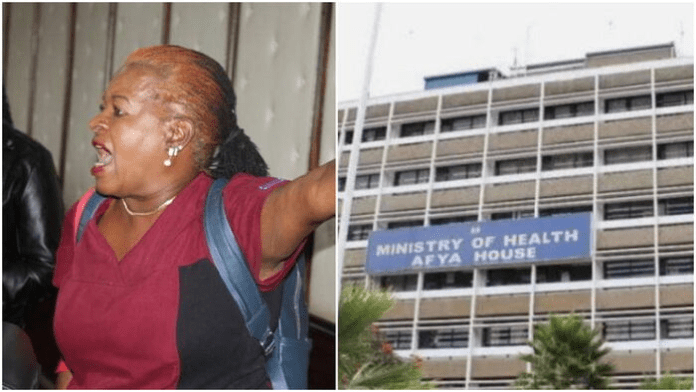Grace Njoki, the woman arrested for allegedly disrupting Health Cabinet Secretary Deborah Barasa’s press conference on Monday, January 20, has recounted her ordeal at the hands of police officers.
Speaking to journalists on Friday morning, shortly after being released on a Ksh10,000 bail, the 61-year-old accused police of violating her rights by arresting her without providing a clear reason.
Njoki narrated that she was apprehended while seeking treatment at Ladnan Hospital in Nairobi. She recalled noticing a man trailing her from Kenyatta National Hospital to Ladnan Hospital before the arrest.
According to Njoki, two individuals—a man and a woman—approached her at the hospital and demanded that she surrender or face arrest.
“I asked them why they were arresting me and where they were taking me, but they refused to answer. They insisted they were not arresting me,” Njoki stated.
Realizing the situation, Njoki said she attempted to alert her son and husband but was prevented from doing so when officers confiscated her phone. She claimed that despite efforts by hospital staff to intervene, around 20 armed police officers from Pangani Police Station forcefully removed her from the hospital.
“I was forcibly taken out of the hospital, dragged, pinched, and bullied. The officers never told me the reason for my arrest,” she lamented.
Njoki further disclosed that she suffered a heart attack during the ordeal, adding that officers pressured her to write a statement without explaining the charges against her. She described being taken to three different locations before finally being held at Capital Hill Police Station, where she spent the night awaiting her arraignment.
Meanwhile, the Directorate of Criminal Investigations (DCI) confirmed Njoki’s arrest on Thursday, January 23. The DCI stated that she was tracked down to Hombe Road, off Juja Road, and apprehended for allegedly causing a disturbance at the Ministry of Health.
Njoki’s experience has sparked concern among rights advocates, who argue her treatment may have violated constitutional protections.







